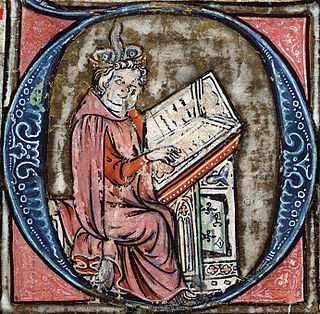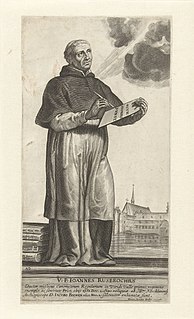 W
WHein van Aken, also called Hendrik van Aken or van Haken, was the parish priest in Korbeek-Lo, between Leuven and Brussels. He was born in Brussels, probably in the thirteenth century. He translated the Roman de la Rose by Guillaume de Lorris and Jean de Meun to Dutch, with the title Het Bouc van der Rosen,. Hein's translation, also commonly called Die Rose, was widespread. This is notable due to the many manuscripts and excerpts that are still preserved, for example in the University Library of Ghent. He is probably also the poet of the Historie van Saladyn. With less reason, some also attribute the Natuurkunde van het Geheel-al to him, but a poem by him must be kept in the Comburger manuscript.
 W
WCornelis de Bie was a Flemish rederijker, poet, jurist and minor politician from Lier. He is the author of about 64 works, mostly comedies. He is known internationally today for his biographical sketches of Flemish and Dutch painters in his Het Gulden Cabinet der Edel Vry Schilderconst, first printed in 1662.
 W
WAnna Bijns or Anna Byns was a Flemish poet who wrote in the Dutch language. She was an educator and the administrator of a primary school in Antwerp until the age of 80. Even while as a woman she was denied membership of a local chamber of rhetoric, she was able to publish her works and find widespread recognition for her literary talent among her contemporaries. She is the first author in Dutch-language literature who mainly owed her success to the recently invented printing press. Her works were reprinted multiple times during her lifetime. In the religious conflicts of her time she chose the side of the Catholic church and expressed in her poems sharp criticism of the teachings of Martin Luther. She is also known for her verses criticising the institution of marriage.
 W
WOgier Ghiselin de Busbecq, sometimes Augier Ghislain de Busbecq, was a 16th-century Flemish writer, herbalist and diplomat in the employ of three generations of Austrian monarchs. He served as ambassador to the Ottoman Empire in Constantinople and in 1581 published a book about his time there, Itinera Constantinopolitanum et Amasianum, re-published in 1595 under the title of Turcicae epistolae or Turkish Letters. His letters also contain the only surviving word list of Crimean Gothic, a Germanic dialect spoken at the time in some isolated regions of Crimea. He is credited with the introduction of tulips into western Europe and to the origin of their name.
 W
WNicolas Cleynaerts was a Flemish grammarian and traveler. He was born in Diest, in the Duchy of Brabant.
 W
WPhilippe de Commines was a writer and diplomat in the courts of Burgundy and France. He has been called "the first truly modern writer" and "the first critical and philosophical historian since classical times". Neither a chronicler nor a historian in the usual sense of the word, his analyses of the contemporary political scene are what made him virtually unique in his own time.
 W
WEmmanuel de Aranda was a Southern Netherlands traveler, historian and poet. He lived for two years as a Barbary slave and wrote a famous book about his experiences.
 W
WWillem van Haecht, sometimes also Willem van Haecht the elder to distinguish him from the painter Willem van Haecht was a Flemish poet writing in the Dutch language. He was also a cloth merchant, draughtsman, a bookseller and publisher. He was a member since 1552 and from 1558 a factor of the chamber of rhetoric De Violieren in Antwerp. In that role he played an important part in the transition of the development of theatre in Flanders from plays mainly dealing with epic, moralising or allegorising themes towards plays expressing the humanist ideas of the Renaissance. He published the Psalms of the Bible in Dutch verse and also wrote poems and songs.
 W
WCornelis Kiliaan, was a 16th-century lexicographer, linguist, translator and poet of the Southern Netherlands.
 W
WJacob van Maerlant was a Flemish poet of the 13th century and one of the most important Middle Dutch authors during the Middle Ages.
 W
WBarbara Ogier was a Flemish playwright of De Olijftak, a chamber of rhetoric in Antwerp. Her motto was "Deugd voeght yder".
 W
WThe Blessed John van Ruysbroeck, original Flemish name Jan van Ruusbroec was an Augustinian canon and one of the most important of the Flemish mystics. Some of his main literary works include The Kingdom of the Divine Lovers, The Twelve Beguines, The Spiritual Espousals, A Mirror of Eternal Blessedness, The Little Book of Enlightenment, and The Sparkling Stone. Some of his letters also survive, as well as several short sayings. He wrote in the Dutch vernacular, the language of the common people of the Low Countries, rather than in Latin, the language of the Church liturgy and official texts, in order to reach a wider audience.
 W
WMichiel de Swaen was a surgeon and a rhetorician from the Southern Netherlands.
 W
WMaximilian van Sevenbergen, Latinized in Maximilianus Transylvanus , also Maximilianus of Transylvania and Maximilian (Maximiliaen) von Sevenborgen, was a courtier of Emperor Charles V who is mainly known for having authored the earliest account published on Magellan and Elcano's first circumnavigation of the world (1519–22). Written after he interviewed the survivors of the Victoria, and being a relative of sponsor Christopher de Haro, his account De Moluccis Insulis is a main source about the expedition along with those of Antonio Pigafetta and Peter Martyr.
 W
WMarcus van Vaernewijck (1518–1569) was a historian in the Habsburg Netherlands. Two of his works, Van die beroerlicke tijden in die Nederlanden en voornamelick in Ghendt 1566-1568 and De historie van Belgis, are listed in the Canon of Dutch Literature compiled by the Digital Library for Dutch Literature.
 W
WJan-Baptist Chrysostomus Verlooy was a Brabantian jurist and politician from the Southern Netherlands.